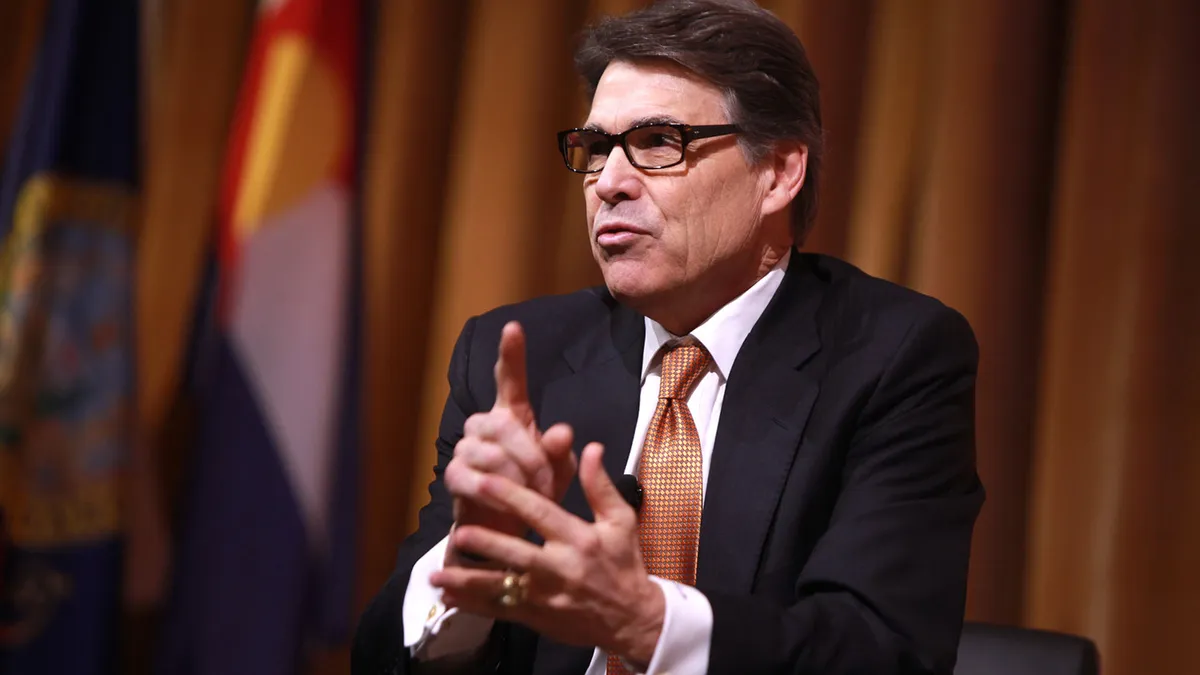Dive Brief:
- A draft version of the Department of Energy's baseload power and grid assessment concludes that reliability is not threatened by the continued retirement of coal and nuclear plants, and that renewable energy is not predominantly responsible for their closure.
- Renewable energy and environmental regulations have "exacerbated" the trend of baseload retirements, the draft concludes, but those factors "have played a minor role" compared to the impacts of low natural gas prices and stagnant power demand growth.
- The draft, dated June 26, is not the final version of the report and does not include policy recommendations. DOE officials told media outlets the text faulting gas prices and power demand is no longer in the working document, and Secretary of Energy Rick Perry said Tuesday that he has not yet seen the draft report.
Dive Insight:
The DOE's draft baseload power review, released Monday by ThinkProgress, confirms what most power sector stakeholders already know — reliability is not threatened in the short term by baseload plant retirements, and renewables are not primarily responsible for the closures.
Noting that reserve margins across the United States (except in ERCOT) have grown in recent years, the study concludes that "most common metrics ... suggest the grid is in good shape despite the continued retirement of baseload plants."
When Secretary of Energy Rick Perry ordered the study in April, many clean energy interests feared it would conclude that wind and solar were pushing baseload plants offline. Perry later said the Trump administration could seek to overrule state energy policies if it concluded reliability was threatened.
But the draft study finds that most of those retirements in the last 15 years were not premature and are largely the result of age and market forces.
"Since 2002, most baseload power plant retirements have been the victims of overcapacity and relatively high operating cost that often reflect the advanced age of the retiring plants," the draft concludes. "In other words, many retirements are consistent with market forces."
Some baseload generators have retired early, the report notes. For those, low electricity market prices brought on by the shale gas boom and stagnant power demand are the predominant factors.
"Costly environmental regulations and subsidized renewable generation have exacerbated and accelerated baseload plant retirements," the draft notes. "However, those factors played minor roles compared to the long-standing drop in electricity demand relative to previous expectations and years of low electric prices driven by high natural gas availability."
Retirement of aging coal and nuclear plants are expected to continue, absent some policy intervention like state nuclear subsidies. As long as gas prices stay low and renewables contribute to "an oversupply of energy in many hours of the day and year," then most nuclear plants "will lose money on every kWh produced, and not be able to make it up on volume.”
The prognosis is similar for coal plants, with the study noting that most retiring units are "old and inefficient units that were not recovering their operations and fuel costs, much less capital cost recovery.”
The DOE findings are consistent with a raft of research from national laboratories, independent consultancies and grid operators. One recent study from Columbia University concluded that 49% of the recent decline in coal consumption is due to natural gas competition, 26% from lower power demand, and 18% from renewable energy growth.
How those findings will be related into policy recommendations in the final report remains to be seen. While DOE officials say the text on causes of baseload retirements is no longer in the working version of the report, it remains unclear whether the passages underwent minor changes, a major rewrite, or were deleted from the report outright.
Political appointees at federal agencies often attempt to leave their stamp on reports prepared by career staffers, so the final product could look markedly different from the draft.
Also in question is the release date of the final report. Originally scheduled for June 26, it appears the draft report has not yet reached the highest officials at DOE.
"I haven't seen it," Secretary Perry told reporters at a Tuesday morning event. "I'm breathlessly waiting just like you."
This post has been updated to reflect DOE statements to E&E News and Bloomberg on revisions to the draft study, as well as Secretary Perry's Tuesday comments.













